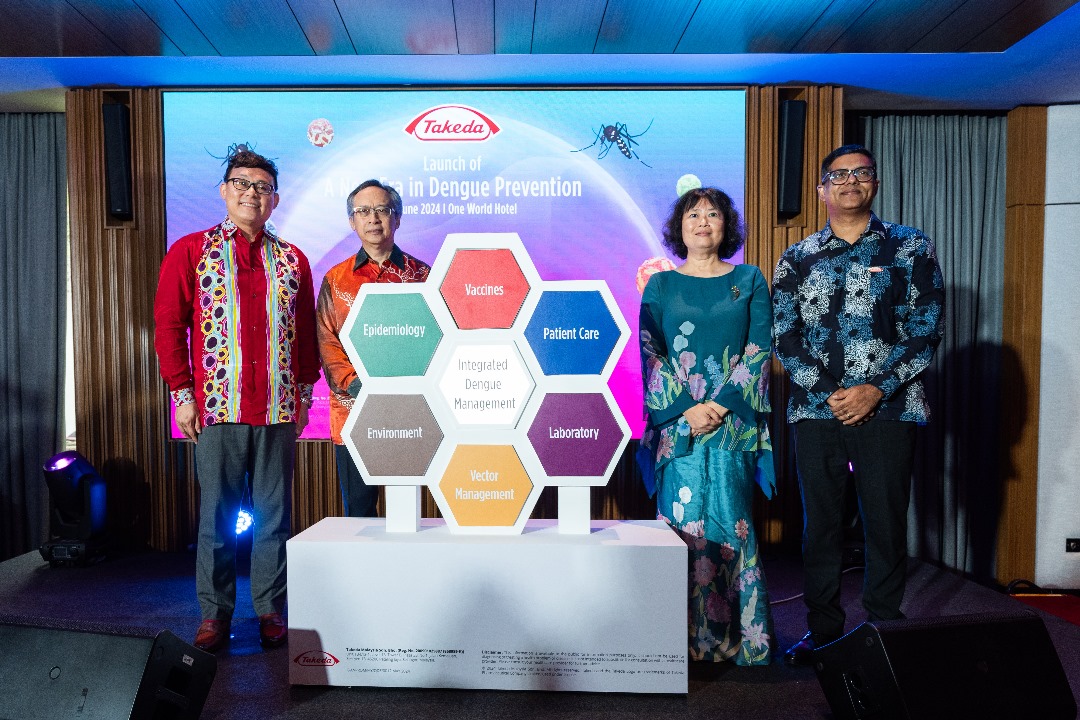
Takeda Malaysia has announced the launch of Qdenga, (MAL24026009ACZ & MAL24026010ACZ) (Dengue Tetravalent Vaccine [Live, Attenuated]), indicated for the prevention of dengue disease caused by all four dengue virus serotypes. Qdenga was approved by The Drug Control Authority (DCA) Malaysia based on extensive data demonstrating its efficacy, safety and quality. The vaccine is indicated for individuals aged 4 years and older[1] and is now available in most private hospitals and clinics across the country.
“Effective dengue prevention requires a multi-faceted approach. The availability of Qdenga is a crucial addition to the current integrated dengue prevention and management strategies in Malaysia. We are committed to partnering with local health authorities and health experts to ensure Qdenga is accessible to all eligible Malaysians who may benefit from immunisation. We deeply understand the importance of safeguarding our communities from dengue fever and recognize the transformative impact vaccines can have on public health,” said Dr Lynette Moey, Country General Manager, Takeda Malaysia & Singapore.
Burden of Dengue in Malaysia
Over the past two decades, the global incidence of dengue cases has increased and is now affecting approximately 129 countries, posing a significant global threat.[2] According to the World Health Organisation (WHO), the number of cases has risen from 500,000 in 2000 to 5.2 million in 2019[3], with Asia accounting for 70% of the burden.[4]
In Malaysia, dengue cases have increased significantly, with 123,133 cases reported in 2023, marking an 86.3% rise compared to the previous year. Dengue-related deaths also increased by 78.6%, with the highest concentration of cases in Selangor.[5] In the first quarter of 2024, there were 41,565 reported cases and 28 deaths attributed to dengue fever complications, showing a rise compared to the same period in 2023.[6]
Public healthcare experts are hopeful that dengue vaccination programmes, implemented strategically, could help to relieve the burden of dengue, which affects every level of society.[7] The burden on individuals is also significant – it can impact entire households, threaten livelihoods, and cause lingering illness, among others. Furthermore, the second infection is associated with a higher risk for severe dengue, which can lead to hospitalisation, organ damage and death.[8]
Elaborating further, Professor Datuk Dr Zulkifli Ismail, Consultant Paediatrician and Paediatric Cardiologist and Chairman of Dengue Prevention Advocacy Malaysia (DPAM), said, “Dengue weighs heavily on us as a nation and despite intensive efforts to mitigate its impact, cases continues to climb, along with the cost of vector control, productivity loss and consumption of healthcare resources. To effectively fight dengue, we need everyone on board. This means bringing together government, private sector, academic institutions, and community in a unified effort to combat the threat. Vaccination will be an additional armamentarium that will complement the current efforts in controlling the disease.”
The Qdenga clinical trial met its primary endpoint of overall vaccine efficacy (VE) by preventing 80.2% of symptomatic dengue cases at 12 months after vaccination. In addition, Qdenga met its key secondary endpoint by preventing 90.4% of hospitalisations at 18 months after vaccination. Over the course of four and a half years (54 months) follow-up data, Qdenga demonstrated continued overall protection and was generally well tolerated, with sustained overall VE of 84.1% and 61.2% against hospitalised and symptomatic dengue respectively.
Currently, Qdenga has been approved in more than 30 countries, including the European Union, the United Kingdom, Brazil, Argentina, Indonesia, Thailand, Vietnam, and Malaysia. The World Health Organisation (WHO) recommends that countries consider introducing Qdenga into their public immunisation programmes in countries where high transmission intensity of dengue poses a significant public health problem.[9] Qdenga has recently been included in the WHO’s List of Prequalified Vaccines, reinforcing its quality and suitability for use in public vaccination programmes.[10]
Malaysians can now consult with their doctors and healthcare professionals in private hospitals and clinics to learn more about the vaccine for dengue prevention and protection.
**All claims expressed in this article are solely those of the authors and do not necessarily represent those of their affiliated organisations, or those of the publisher, the editors and the reviewers. Any product that may be evaluated in this article, or claim that may be made by its manufacturer, is not guaranteed or endorsed by the publisher.
————————————————————